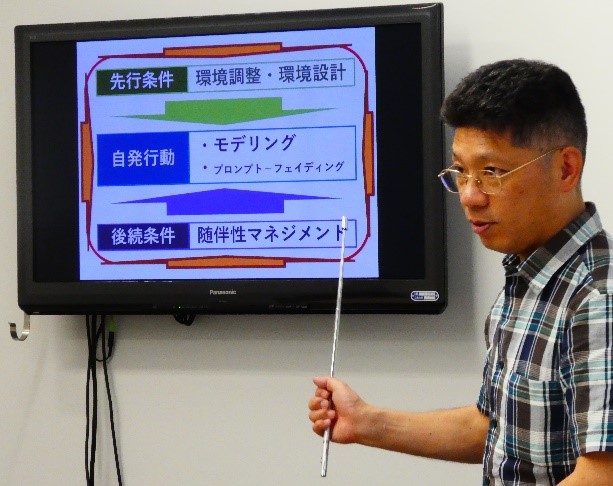Get a good sleep, eat well, turn off the TV and go outside to play
OISHI Kouji (College of Contemporary Psychology)
Jul 23, 2018
OVERVIEW
In 2006, the Ministry of Education, Culture, Sports, Science and Technology (MEXT) launched its Child Life Rhythm Improvement Project, an initiative to help people establish good habits from early in life. School teacher experience has found that staying up late, skipping breakfast, and other bad habits seem to have an effect on student physical health, motivation, learning ability and other issues. However, in order to prove that relationship, we cannot rely solely on teacher experience; we need the cooperation of scientists who work in psychology and scientists who work in the life sciences.

Explaining research progress to graduate and seminar students involved in the project
External mental stress can cause infl ammation of the intestinal walls and help bad bacteria breed. In fact, improving such issues can even lead to better mental stability. Everyone in Japan knows that they should eat grains, beans and dairy to have a better intestinal environment.
Peopleʼs intestines function differently depending on the country they are from, so it is also important to show people in Japan what sort of things are good for them specifically. In addition, by observing the intestinal environment, we can learn what sorts of constitutions are more easily stressed. By being conscious of our own stress tolerance, we can learn how to handle external pressure and stress becomes easier to avoid. It is thought that this will help prevent suicide and depression.
The research team working on this project is scheduled to propose concrete and practical methods of protecting mental health to major pharmaceutical companies, hospitals, and social welfare facilities in three years. Perhaps through this project, Professor Oishi will be able to prove that lifestyle habits such as getting a good sleep, eating well, turning off the TV, and playing outside correlate to better motivation and mental stability among children.
However, we can do the same thing right now. Simply get up early, have a good breakfast, and become more positively involved with other people.
RECENT TOPICS
Oct 17, 2025
MSDA Rikuzentakata Field Trip 2025
Master of Social Development and Administration (MSDA) Course